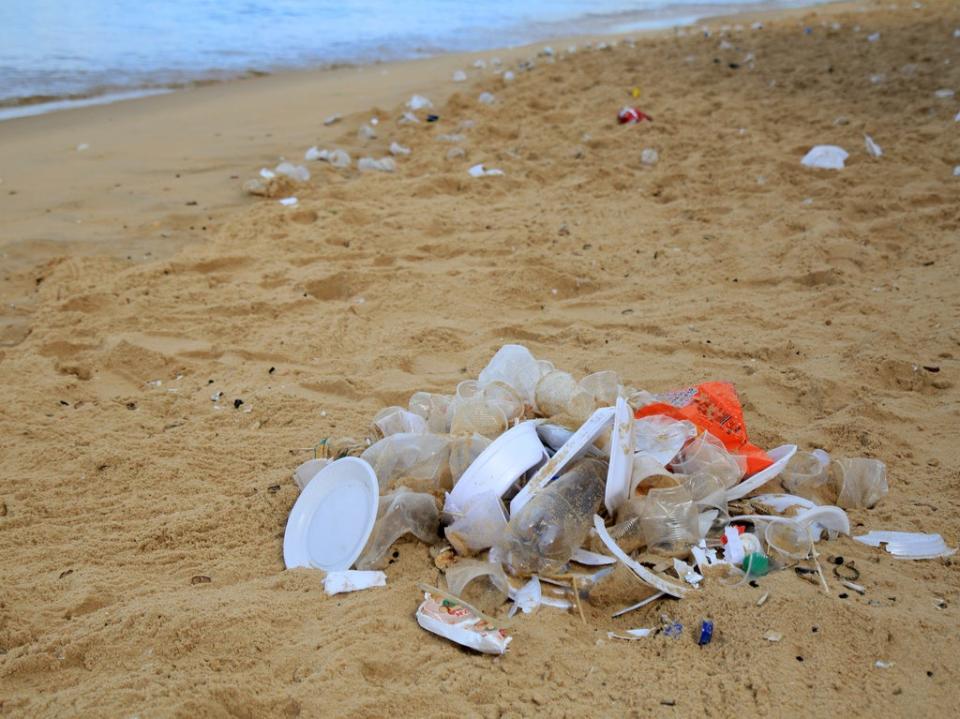Beach litter at its lowest in 20 years due to plastic bans

The amount of litter found on beaches has dropped to the lowest level in more than 20 years, suggesting that bans on some single-use plastics is helping to reduce litter.
The Marine Conservation Society (MCS), which has run the UK’s largest annual litter-picking event since 1994, said that the number of litter items found per 100 metres has reduced significantly since the peak in 2014.
An average of 385 items of litter were found per 100 metres this year, down from 425 in 2020, 558 in 2019, and the peak of 835 in 2014.
More than 6,000 people volunteered for the Great British Beach Clean in 2021, which took place between 17 to 26 September.
They removed a total of 5,065kg of litter from more than 55,000 metres of beaches around the UK, as well as from local streets and parks.
The MCS said that they saw a fall in certain types of single-use plastic items that have been banned, such as cotton bud sticks. This year, the beach clean recorded the lowest number of cotton bud sticks collected from beaches in its 28-year history.
Scotland became the first UK nation to ban the manufacture and sale of plastic cotton bud sticks in October 2019, with England following suit last year with a ban on plastic straws and stirrers as well.
The number of single-use plastic bags on beaches have also continued to drop after the government introduced charges on them, from an average of 13 per stretch of beach in 2013 to just three in 2021.
However, a large majority (75 per cent) of the items collected were made of plastic or polystyrene, which made up 112 items per 100m on average. This was followed by cigarette stubs, crisp and sweet packets and lolly sticks, plastic caps and lids, and string or cord.
The conservation charity is calling on ministers to phase out the manufacture and sale of plastic products in the UK, warning that the government can’t “sit back and relax”.
Lizzie Prior, MCS beach watch manager, said: “The ongoing trend we’re seeing in litter levels on UK beaches is a positive sign that the actions we’re taking at a personal, local and national level are working.
“But we can’t sit back and relax, now is the time for even more ambitious action.”
Dr Laura Foster, head of clean seas at the charity, warned: “Governments’ current piecemeal approach to single-use plastics policy just won’t cut it more.
“While we’re seeing a downward trend in litter on beaches, we’re still seeing huge volumes of plastic washing up on our shores.
“A shocking 75 per cent of all the litter we collected from UK beaches this year was made of plastic or polystyrene, so it’s clear what we need to focus our attention on.
She added: “Comprehensive and ambitious single-use plastics policies which reduce the manufacture and sale of items is the quickest way of phasing out plastic from our environment.”
A report of what was found during this year’s beach clean also showed that levels of personal protective equipment (PPE) were similar to 2020.
Nearly a third (32 per cent) of the beaches cleaned had PPE litter. However, masks were further down on the list of the most common items found, at 59th out of 121.
A spokesperson for the Department of Environment, Food and Rural Affairs (Defra), said: “We’re pleased to see the amount of litter being found on our beaches dropping and the positive impact of our policies such as the single-use carrier bag charge.”
They added that the government launched a public consultation on proposals to ban a range of single-use plastic items, including plates and cutlery, and has called for evidence on other plastics such as wet wipes and tobacco filters.
Read More
Prince William says we ‘owe it to our children’ to combat climate crisis
Kate Middleton re-wears emerald green gown at Royal Variety Performance
Prince William says we ‘owe it to our children’ to combat climate crisis
Kate Middleton re-wears emerald green gown at Royal Variety Performance

